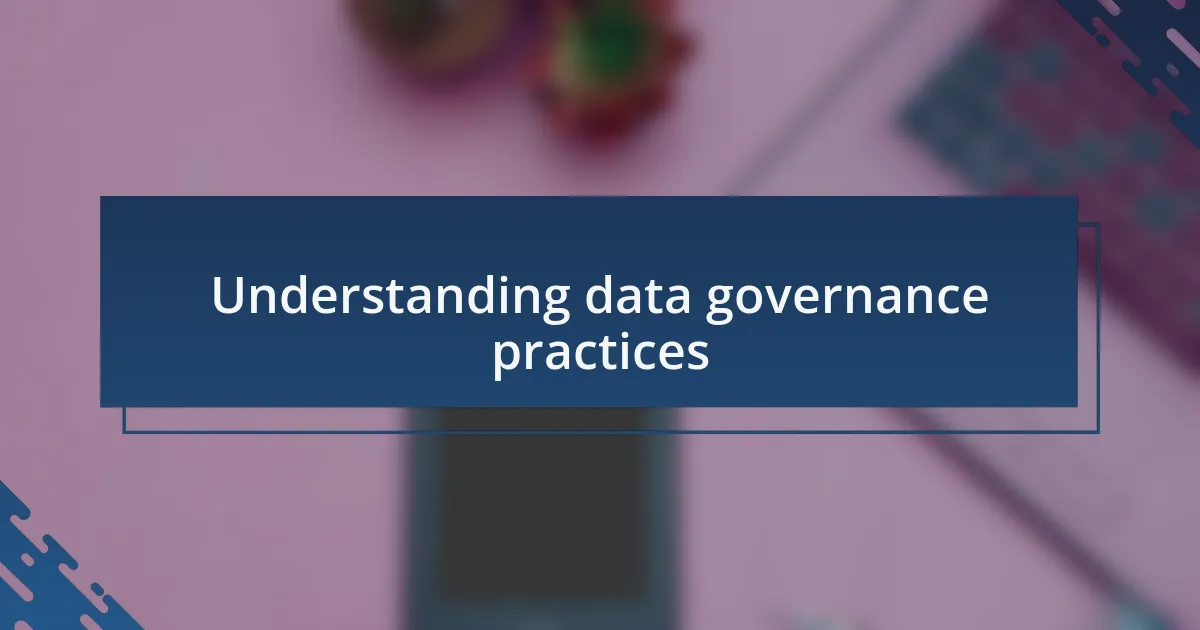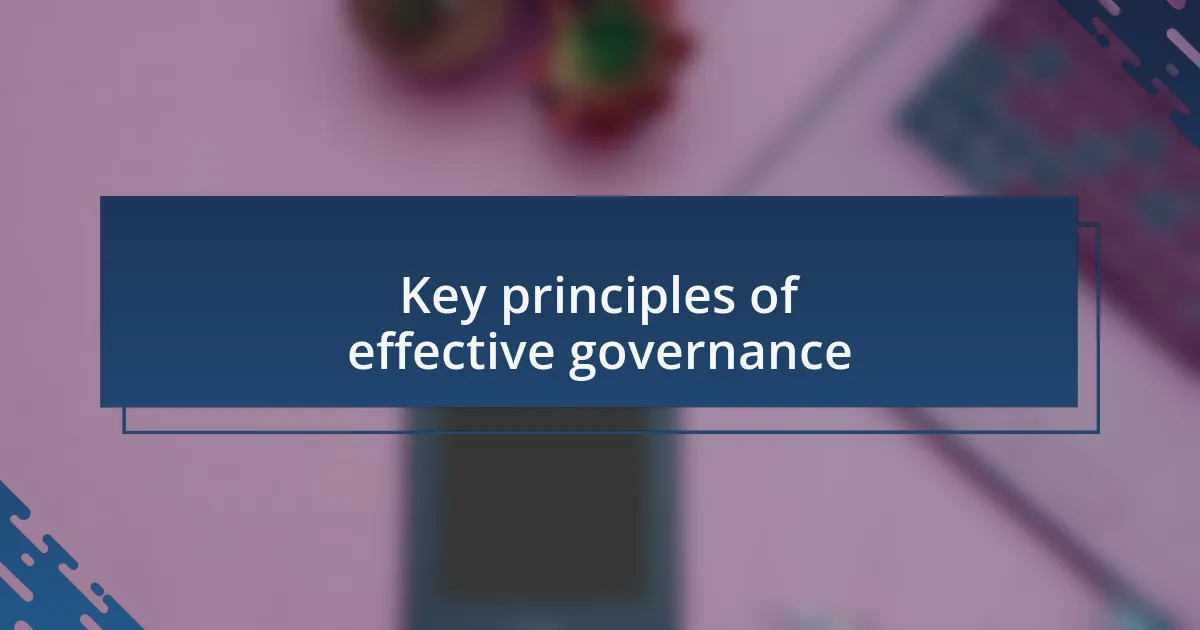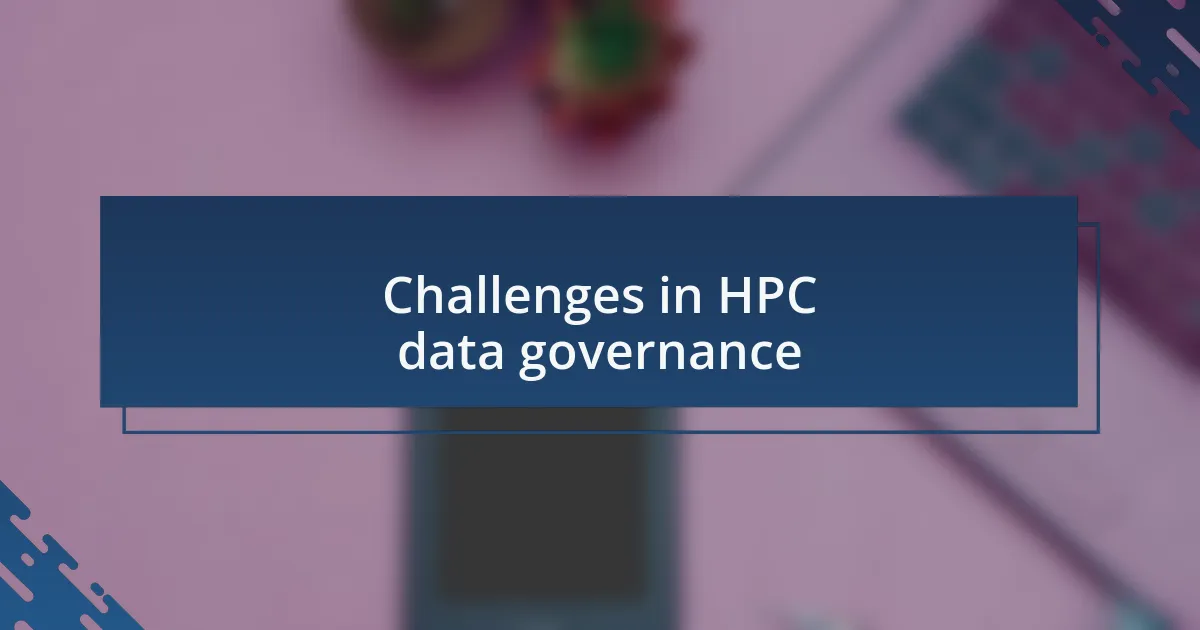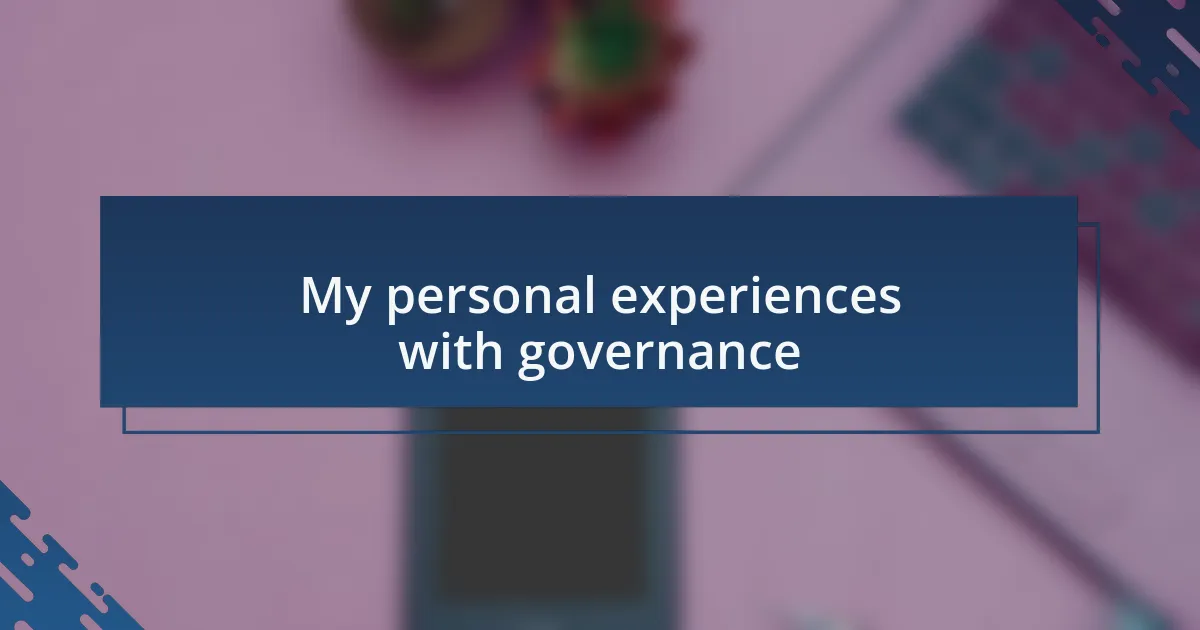Key takeaways:
- Effective data governance ensures data accuracy, consistency, and compliance, fostering a culture of integrity and accountability within organizations.
- Key principles of governance include clearly defined roles, uniform data standards, and adaptability to change, essential for navigating the evolving data landscape.
- Challenges in HPC data governance include managing large data volumes, navigating regulatory compliance while fostering innovation, and ensuring effective communication among stakeholders.
- Building trust and nurturing a supportive culture are crucial for successful governance practices, encouraging feedback and collaboration across teams.

Understanding data governance practices
Understanding data governance practices is crucial for organizations aiming to manage their data effectively. In my experience, having a clear framework helps ensure that data is consistent, accurate, and secure. Take, for instance, a project I was involved in where poor data management led to conflicting reports, creating confusion and mistrust among team members. It got me thinking: how can we expect to make data-driven decisions if our data isn’t governed properly?
To me, data governance is about defining who can access data, how it’s maintained, and ensuring compliance with relevant regulations. It’s not just a checklist; it’s a commitment to maintaining high standards. I remember a time when my team faced regulatory scrutiny because we hadn’t fully grasped our data lineage. That was a wake-up call. I started to appreciate that good governance is not only about policies but also about fostering a culture that values data integrity.
Ultimately, effective data governance practices instill confidence within organizations. They empower employees by providing clarity on data usage and responsibilities. Can you recall a moment when you hesitated to trust a dataset? I know I have. Those moments underline the importance of transparency and accountability in data governance. It’s not just about protecting data; it’s about transforming it into a valuable asset for everyone involved.

Key principles of effective governance
Effective governance rests on several key principles, one of which is accountability. In my experience, when roles and responsibilities are clearly defined, it fosters a sense of ownership among team members. I once worked on a project where accountability was lacking; this led to data mishandling and ultimately a setback in our deliverables. Reflecting on that, I can confidently say that when people understand their stakes in data governance, they are more invested in maintaining its quality.
Another vital principle is consistency. Establishing uniform data standards across an organization is crucial. There was a time when my team used different formats for reporting data, which caused frustration during collaboration. It made me realize that without a shared understanding of how to handle data, we were wasting time and resources. Consistency brings a layer of clarity that allows for seamless integration and transferral of information.
Lastly, adaptability is essential in effective governance practices. The landscape of data is ever-evolving, and so should our governance frameworks. I recall a situation where outdated protocols were hindering our ability to leverage new technologies. It was a stark reminder that staying flexible is key to ensuring data governance practices remain relevant and effective. How have you adapted your governance strategies in response to change? I find that those who embrace adaptability often lead the way in navigating complex data environments.

Challenges in HPC data governance
One significant challenge I’ve encountered in HPC data governance is the sheer volume and velocity of data generated. In my previous role, we had to manage massive datasets, often at a scale we hadn’t anticipated. This rapid influx made it incredibly difficult to implement consistent quality checks, and I found myself wondering—how can we ensure that our governance frameworks evolve to keep pace with this data deluge? It’s a constant battle to balance speed and accuracy, and I believe it’s crucial to establish robust processes that can scale effectively.
Another hurdle in HPC data governance revolves around regulatory compliance. In a project I participated in, we faced strict guidelines due to data collected from sensitive research. The pressure to comply led to internal conflicts over data sharing practices, creating a culture of hesitation instead of collaboration. It left me considering how we can marry compliance with innovation—shouldn’t governance enable us to push boundaries while meeting legal standards? This tension between creativity and regulation can stifle potential if not navigated carefully.
Lastly, effective communication among stakeholders stands out as a persistent challenge. I’ve often seen technical teams struggle to translate complex data governance policies into terms that everyone can understand. There was an instance where miscommunication resulted in significant data discrepancies due to varying interpretations of policy. Have you ever found yourself in a similar situation? I believe that fostering open dialogues and investing time in training can bridge the gap, allowing for a more coherent understanding across diverse teams. Without that clarity, even the best governance strategies can fall short.

My personal experiences with governance
Reflecting on my experiences with governance, I recall a project where we implemented a new data management policy. Initially, there was resistance from some team members who felt overwhelmed by the added bureaucracy. I found myself empathizing with them, recalling the anxiety I felt when first confronted with complex governance frameworks. It made me realize that effective governance isn’t just about rules; it requires nurturing a supportive culture that embraces change.
One particularly enlightening moment occurred during a review meeting when a junior analyst raised her concerns about the policy’s implications. Her questions were insightful but also highlighted just how disconnected some of us felt from the governance processes. This experience taught me that governance should be a two-way street—where feedback is not only encouraged but actively sought out. How can we expect to improve governance if we don’t listen to those directly impacted by it?
There was also a time when I spearheaded a cross-department initiative for better data sharing, only to face pushback from a few senior leaders. I felt the weight of responsibility on my shoulders. Their reluctance stemmed from a fear of losing control over their data, which reminded me that trust is fundamental in governance. Building that trust took time and transparency, proving to me that while structures are important, relationships are ultimately what enable successful governance practices.